De Oostenrijkse dichteres Ingeborg Bachmann werd geboren op 25 juni 1926 in Klagenfurt. Zie ook mijn blog van 25 juni 2006 en ook mijn blog van 25 juni 2007 en ook mijn blog van 25 juni 2008.
Die große Fracht
Die große Fracht des Sommers ist verladen,
das Sonnenschiff im Hafen liegt bereit,
wenn hinter dir die Möwe stürzt und schreit.
Die große Fracht des Sommers ist verladen.
Das Sonnenschiff im Hafen liegt bereit,
und auf die Lippen der Galionsfiguren
tritt unverhüllt das Lächeln der Lemuren.
Das Sonnenschiff im Hafen liegt bereit.
Wenn hinter dir die Möwe stürzt und schreit,
kommt aus dem Westen der Befehl zu sinken;
doch offnen Augs wirst du im Licht ertrinken,
wenn hinter dir die Möwe stürzt und schreit.
Abschied von England
Ich habe deinen Boden kaum betreten,
schweigsames Land, kaum einen Stein berührt,
ich war von deinem Himmel so hoch gehoben,
so in Wolken, Dunst und in noch Ferneres gestellt,
daß ich dich schon verließ,
als ich vor Anker ging.
Du hast meine Augen geschlossen
mit Meerhauch und Eichenblatt,
von meinen Tränen begossen,
hieltst du die Gräser satt;
aus meinen Träumen gelöst,
wagten sich Sonnen heran,
doch alles war wieder fort,
wenn dein Tag begann.
Alles blieb ungesagt.
Durch die Straßen flatterten die großen grauen Vögel
und wiesen mich aus.
War ich je hier?
Ich wollte nicht gesehen werden.
Meine Augen sind offen.
Meerhauch und Eichenblatt?
Unter den Schlangen des Meers
seh ich, an deiner Statt,
das Land meiner Seele erliegen.
Ich habe seinen Boden nie betreten.
Psalm
1
Schweigt mit mir, wie alle Glocken schweigen!
In der Nachgeburt der Schrecken
sucht das Geschmeiß nach neuer Nahrung.
Zur Ansicht hängt karfreitags eine Hand
am Firmament, zwei Finger fehlen ihr,
sie kann nicht schwören, daß alles,
alles nicht gewesen sei und nichts
sein wird. Sie taucht ins Wolkenrot,
entrückt die neuen Mörder
und geht frei.
Nachts auf dieser Erde
in Fenster greifen, die Linnen zurückschlagen,
daß der Kranken Heimlichkeit bloßliegt,
ein Geschwür voll Nahrung, unendliche Schmerzen
für jeden Geschmack.
Die Metzger halten, behandschuht,
den Atem der Entblößten an,
der Mond in der Tür fällt zu Boden,
laß die Scherben liegen, den Henkel …
Alles war gerichtet für die letzte Ölung.
(Das Sakrament kann nicht vollzogen werden.)

Ingeborg Bachmann (25 juni 1926 – 17 oktober 1973)
De Amerikaanse schrijver, columnist en homoactivist Larry Kramer werd geboren in Bridgeport, Connecticut op 25 juni 1935. Hij werd genomineerd voor een Academy Award, was finalist voor een Pulitzer-prijs en ontving tweemaal een Obie Award. Als antwoord op de Aids-crisis richtte hij Gay Men’s Health Crisis op, de grootste organisatie van zijn soort op de wereld. Hij schreef The Normal Heart, het eerste serieuze artistieke onderzoek naar de Aids-crisis. Hij richtte later ACT UP op, een protestorganisatie die wordt geaccrediteerd voor het veranderen van het volksgezondheidbeleid en de openbare voorlichting van Hiv en Aids. Kramer woont momenteel in New York City en Connecticut.
Uit: Yale’s Conspiracy of Silence
„Here are some of the things that I have uncovered about our history in writing my new book, The American People:
That Jamestown was America’s first community of homosexuals, men who came to not only live with each other as partners but to adopt and raise children bought from the Indians. Some even arranged wedding ceremonies for themselves.
That George Washington was gay, and that his relationships with Alexander Hamilton and the Marquis de Lafayette were homosexual. And that his feelings for Hamilton led to a government and a country that became Hamiltonian rather than Jeffersonian.
That Meriwether Lewis was in love with William Clark and committed suicide when their historic journey was over and he wouldn’t see Clark anymore.
That Abraham Lincoln was gay and had many, many gay interactions, that his nervous breakdown occurred when he and his lover, Joshua Speed, were forced to part, and that his sensitivity to the slaves came from his firsthand knowledge of what it meant to be so very different. And that the possibility exists that Lincoln was murdered because he was gay and John Wilkes Booth, who was gay, knew this.
That Franklin Pierce, who became one of America’s worst presidents, and Nathaniel Hawthorne, who became one of our greatest writers, as roommates at Bowdoin College had interactions that changed them both forever and, indeed, served as the wellspring for what Hawthorne came to write about. Pierce was gay. And Hawthorne? Herman Melville certainly wanted him to be.”
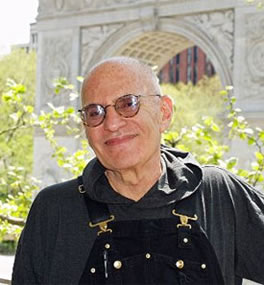
Larry Kramer (Bridgeport, 25 juni 1935)
De Amerikaanse schrijfster en journaliste Ariel Gore werd geboren op 25 juni 1970 in Carmel, Californië. Zij is de uitgeefster en redacteur van Hip Mama, een periodiek over politieke en culturele aspecten van het moederschap. In 2000 verscheen haar autobiografische Atlas of the Human Heart, in 2006 de roman The Traveling Death and Resurrection Show.
Uit: Traveling Death and Resurrection Show
“Whoosh. Car tires through puddles. Gasoline rainbows. Picture this: Two beat-up candy apple red hatchbacks trailing a wildflower-painted caravan down a sogged main street that creeps southward along the waterfront.
Madre Pia shouts through a cracked megaphone from the back of the caravan as we roll into town: “The lost will be saved, the saved will be amazed!” She’s a vision, Madre is. Three hundred pounds of blithe drag queen cloaked in her old-school nun’s habit, great bellowing penguin. “Tonight only, ladies and gentlemen! Saint Cat will manifest the wounds of Christ.”
Rain-wet asphalt and dull brick buildings welcome us to empty streets. Steely June sky. We haven’t seen the sun in weeks. Northwestern springtime: damp, damp.
“Come and see for yourself,” Madre implores the rows of Victorian houses that cling like swallows’ nests to an inland hill. “Mary Magdalen will perform her death-defying midair acrobatics. Six p.m. tonight. Astoria’s own River Theater!”
A solitary freckled face peers out from a fogged pizza parlor window, kind bewildered reassurance that we haven’t stumbled into a ghost town.
Madre lowers the megaphone to clearher throat, then lifts it to her berry mouth again. “Barbaro the great fire spitter all the way from Venice, Italy!”
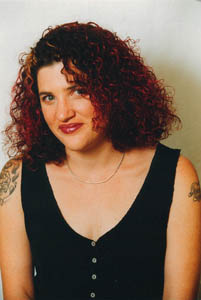
Ariel Gore (Carmel, 25 juni 1970)
De Canadese schrijver Michel Tremblay werd geboren in Quebec op 25 juni 1942. Na het beëindigen van zijn middelbare schooltijd ging hij op 18-jarige leeftijd naar the Graphic Arts Institute van Quebec, waar hij het beroep van typograaf leerde. Daar begon hij korte verhalen te schrijven, zoals ‘Stories for Late Night Drinkers’, die dan later werden gepubliceerd. In 1964 won hij met het toneelstuk ‘Le Train’ een wedstrijd voor jonge schrijvers. In 1965, schreef Michel Tremblay ‘Les Belles-Soeurs’, dat 1968 voor het eerst werd uitgevoerd door The Théatre du Rideau Vert in Montreal. Les Belles-Soeurs werd onmiddellijk door critici, alsook door het publiek uitgeroepen tot ‘het belangrijkste evenement binnen het theater van Quebec’. Veel van zijn stukken zijn in het buitenland goed ontvangen, zoals onder meer de producties van Les Belles-Soeurs in Chicago and Glasgow en in 1973 werd Hosanna in Quebec alsook in Parijs voor volle zalen gespeeld. Zijn theaterstukken zijn onder meer opgevoerd in België, Zwitserland, Japan. Tremblay’s werk bevat 24 toneelstukken, 3 musicals, 12 verhalen en een collectie van sprookjes, korte verhalen enfilmscripts.
Uit: The Fat Woman Next Door is Pregnant (Vertaald door Sheila Fischman)
“In the five years he’d been sleeping in the same room with her, Richard had spent an incalculable number of hours watching his grandmother die. In fact, every time he examined her in her sleep, grumbling, scarcely breathing, mouth open to reveal bare white gums as sharp as knives, Richard expected to see her expire. She was an exhausted flickering candle, a dismantled gasping clock, a motor at the end of the road, a dog grown too old, a servant who had finished serving and was dying of boredom, a useless old woman, a beaten human being, his grandmother. If she wanted to do anything in the house, her daughter-in-law, the fat woman, or her daughter-in-law, Albertine, very attentively would anticipate her intentions: “You just rest…you’ve done enough work in your life.. .sit down, Momma, your leg. . .” The old woman would lay down the dishcloth or the wooden spoon, swallowing so she wouldn’t explode. Richard had often seen his grandmother weep with rage, leaning against the window in her room that looked out on the outside staircase. He’d even heard her curse the two women, cast impotent sp
ells on them; he’d seen her stick out her tongue and pretend to be kicking them. From morning to night, she wandered from her bedroom to the dining room, from the dining room to her bedroom, a superfluous object of attention in this house where everyone and everything had assigned tasks or at least some use–except for her.”
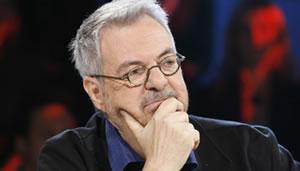
Michel Tremblay (Quebec, 25 juni 1942)
De Britse schrijver George Orwell (pseudoniem van Eric Arthur Blair) werd op 25 juni 1903 geboren in Motihari, India. Zie ook mijn blog van 25 juni 2006 en ook mijn blog van 25 juni 2007 en ook mijn blog van 25 juni 2008.
Uit: The Road To Wigan Pier
“The first sound in the mornings was the clumping of the mill-girls’ clogs down the cobbled street. Earlier than that, I suppose, there were factory whistles which I was never awake to hear.
There were generally four of us in the bedroom, and a beastly place it was, with that denied impermanent look of rooms that are not serving their rightful purpose. Years earlier the house had been an ordinary dwelling-house, and when the Brookers had taken it and fitted it out as a tripe-shop and lodging-house, they had inherited some of the more useless pieces of furniture and had never had the energy to remove them. We were therefore sleeping in what was still recognizably a drawing-room. Hanging from the ceiling there was a heavy glass chandelier on which the dust was so thick that it was like fur. And covering most of one wall there was a huge hideous piece of junk, something between a sideboard and a hall-stand, with lots of carving and little drawers and strips of looking-glass, and there was a once-gaudy carpet ringed by the slop-pails of years, and two gilt chairs with burst seats, and one of those old-fashioned horsehair armchairs which you slide off when you try to sit on them. The room had been turned into a bedroom by thrusting four squalid beds in among this other wreckage.
My bed was in the right-hand corner on the side nearest the door. There was another bed across the foot of it and jammed hard against it (it had to be in that position to allow the door to open) so that I had to sleep with my legs doubled up; if I straightened them out I kicked the occupant of the other bed in the small of the back. He was an elderly man named Mr Reilly, a mechanic of sorts and employed ‘on top’ at one of the coal pits. Luckily he had to go to work at five in the morning, so I could uncoil my legs and have a couple of hours’ proper sleep after he was gone. In the bed opposite there was a Scotch miner who had been injured in a pit accident (a huge chunk of stone pinned him to the ground and it was a couple of hours before they could lever it off), and had received five hundred pounds compensation. He was a big handsome man of forty, with grizzled hair and a clipped moustache, more like a sergeant-major than a miner, and he would lie in bed till late in the day, smoking a short pipe.”

George Orwell (25 juni 1903 – 21 januari 1950)
De Canadese schrijver Yann Martel werd op 25 juni 1963 geboren in Salamanca. Zie ook mijn blog van 25 juni 2007 en ook mijn blog van 25 juni 2008.
Uit: Life of Pi
“My suffering left me sad and gloomy.
Academic study and the steady, mindful practice of religion slowly brought me back to life. I have kept up what some people would consider my strange religious practices. After one year of high school, I attended the University of Toronto and took a double-major Bachelor’s degree. My majors were religious studies and zoology. My fourth-year thesis for religious studies concerned certain aspects of the cosmogony theory of Isaac Luria, the great sixteenth-century Kabbalist from Safed. My zoology thesis was a functional analysis of the thyroid gland of the three-toed sloth. I chose the sloth because its demeanour-calm, quiet and introspective-did something to soothe my shattered self.
There are two-toed sloths and there are three-toed sloths, the case being determined by the forepaws of the animals, since all sloths have three claws on their hind paws. I had the great luck one summer of studying the three-toed sloth in situ in the equatorial jungles of Brazil. It is a highly intriguing creature. Its only real habit is indolence. It sleeps or rests on average twenty hours a day. Our team tested the sleep habits of five wild three-toed sloths by placing on their heads, in the early evening after they had fallen asleep, bright red plastic dishes filled with water. We found them still in place late the next morning, the water of the dishes swarming with insects.”
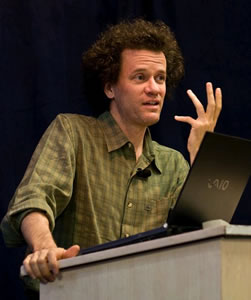
Yann Martel (Salamanca, 25 juni 1963)
De Russische dichter en vertaler Arseny Alexandrovich Tarkovsky werd geboren op 25 juni 1907 in Elisavetgrad. Zie ook mijn blog van 25 juni 2007 en ook mijn blog van 25 juni 2008.
First Meetings
We celebrated every moment
Of our meetings as epiphanies,
Just we two in all the world.
Bolder, lighter than a bird’s wing,
You hurtled like vertigo
Down the stairs, leading
Through moist lilac to your realm
Beyond the mirror.
When night fell, grace was given me,
The sanctuary gates were opened,
Shining in the darkness
Nakedness bowed slowly;
Waking up, I said:
‘God bless you!’, knowing it
To be daring: you slept,
The lilac leaned towards you from the table
To touch your eyelids with its universal blue,
Those eyelids brushed with blue
Were peaceful, and your hand was warm.
And in the crystal I saw pulsing rivers,
Smoke-wreathed hills, and glimmering seas;
Holding in your palm that crystal sphere,
You slumbered on the throne,
And – God be praised! – you belonged to me.
Awaking, you transformed
The humdrum dictionary of humans
Till speech was full and running over
With resounding strength, and the word you
Revealed its new meaning: it meant king.
Everything in the world was different,
Even the simplest things – the jug, the basin –
When stratified and solid water
Stood between us, like a guard.
We were led to who knows where.
Before us opened up, in mirage,
Towns constructed out of wonder,
Mint leaves spread themselves beneath our feet,
Birds came on the journey with us,
Fish leapt in greeting from the river,
And the sky unfurled above…
While behind us all the time went fate,
A madman brandishing a razor.

Arseny Tarkovsky (25 juni 1907 – 27 mei 1989)
De Engelse schrijver Nicholas Mosley werd geboren op 25 juni 1923 geboren in Londen. Hij kreeg zijn opleiding aan Eton en in Oxford. Hij is de oudste zoon van Oswald Mosley en zeer kritisch ten opzichte van zijn vader. Nicholas Mosley uitte dat in zijn boek Beyond the Pale: Sir Oswald Mosley and Family 1933-1980 uit1983, en in een BBC-documentaire in 1997.
Uit: Hopeful Monsters
Sometimes when I sat with my father on the sofa in his study and he had been reading to me stories or articles about science from children’s magazines, I would, at the end of whatever voyage of discovery or imagination we had been on (I was, I suppose, quite a precocious little girl) ask my father about the work he was doing at the university. He told me something of his regular work of lecturing and teaching, but I do not remember much about this. Then he told me of the work that really interested him at this time, which was outside his regular curriculum, and was to do with his efforts to understand, and to put into some intelligible language, the theories that were being propounded about physics at this time by one of his colleagues at the university – a Professor Einstein. I do not think that my father knew Einstein very well, but he venerated him, and he was enough of a mathematician to be able to try to grapple with some of his theories. I, of course, could have comprehended little of the substance of what my father said: but because of his enthusiasm it was as if, on some level, I was caught up in his efforts. I had a picture of Professor Einstein as some sort of magician: there was a photograph of him on the chimney-piece of my father’s study which was a counter-balance to my mother’s photograph of Karl Marx on the chimney-piece of the dining-room. Professor Einstein’s head, set rather loosely on his shoulders, seemed to have a life of its own: Karl Marx’s head seemed to have been jammed down on to his shoulders with a hammer. I would say to my father as we sat above the wonders of the world in our airship “What is it that is so special about the theories of Professor Einstein?”
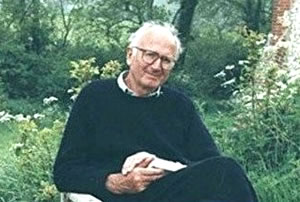
Nicholas Mosley (Londen, 25 juni 1923)
De Franse schrijver Claude Seignolle werd geboren op 25 juni 1917 in Périgueux. Hij heeft zich zijn leven lang bezig gehouden met lege
ndes en folklore uit het Zuidwesten van Frankrijk. Zijn belangrijkste romans zijn Le Rond des sorciers, Marie la Louve, La Malvenue, Le Bahut noir, La Brume ne se lèvera plus, Le Diable en Sabots, Le Gâloup, Le Chupador
Uit: Récits Cruels
„Toute la soirée, et malgré la satisfaction qu’elle devait secrétement éprouver, elle ne montra nulle ivresse de joie, ni aise de plaisir. On l’eût dite anéantie par tant de bonheur. Et lorsque, montés à notre chambre nuptiale, tard, très tard, nous fûmes enfin livrès l’un à l’autre, elle se jeta à mes pieds, m’étreignit les jambes et eut d’amères et incompréhensibles sanglots. Je la relevai tendrement et la déposai sur notre lit : ce parterre de dentelles et de broderies, où passait la fragrance de quelques secrètes lavandes.
Je la relevai tendrement et la déposai sur notre lit : ce parterre de dentelles et de broderies, où passait la fragrance de quelques secrètes lavandes. Elle m’attira et se blottit entre mes bras, me montrant qu’elle avait peur ; qu’il fallait que je la protège ; que je pouvais tout pour elle ; que…
Mais, grisé et fouetté par son comportement de petit animal craintif, je commençai à la dévêtir. Sa peau était aussi douce que ses pleurs. Je frôlai de mes lèvres son cou qui dégageait une légère senteur poivrée. M’attardai à goûter ses joues, veloutées d’un duvet de frissons. Parvins à sa bouche qu’elle me refusa d’abord en détournant la tête, mais qui je conquis et qui me rendit ardemmet mes baisers.“

Claude Seignolle (Périgueux, 25 juni 1917)
De Duitse dichter en schrijver Hans Marchwitza werd geboren in Scharley op 25 juni 1890. Zie ook mijn blog van 25 juni 2007.
Uit: Sturm auf Essen
“Du, wenn du doch daran gedacht hättest, noch einige Lumpen mitzubringen, ich hätte den Kindern paar Hosen draus zusammengestoppelt. Hast nicht dran gedacht…!”
Der Krieg kaut an den Wänden, knackend, schreckend. Draußen flattert Schnee.
An einem Dezembertag war auch Franz Kreusat zurückgekommen. Er hatte, nach der bewegten Wiedersehensszene mit der Mutter, seinen verdreckten Soldatenmantel und den Schal abgeworfen und saß stumm und grübelnd am Tisch. „Zu Haus!” Er sagte es mehrere Male zu sich selbst, um sich an den Gedanken zu gewöhnen, dass er tatsächlich wieder daheim sei. Dieses Glück hatte er sich lange nicht mehr vorstellen können, er hatte daran nicht mehr geglaubt. Er blickte sich halb um, das Gesicht in die Hand gestützt: es war ihre alte Küche. Da stand der gelbe Geschirrschrank, da hing der kleine Spiegel am selben Fleck. Da in der Ecke stand sein Tischchen. Nein, es war kein Traum, er war zu Haus.
„Komm, iss was!” sagte die noch erregt umhertrippelnde Mutter. Sie hatte noch, Gott sei Dank, ein paar Kartöffelchen im Haus gehabt und hatte ihm diese mit einer Messerspitze Fett, der nur selten vorhandenen Kostbarkeit, in dem Pfännchen gebraten. „Komm, iss…!” ermahnte sie und tupfte mit der Schürze die jetzt immer so leicht fließenden Tränen weg. „Komm, iss… Träum nicht!”
Der alte Kreusat, ein großer Mann, aber welk und dürr wie ein kranker, dorrender Baum, saß auf der kleinen Fußbank am Herd und schnaubte. Als ihm der Sohn die Hand gegeben – denn für eine Umarmung fühlten sich beide zu scheu -, hatte der alte Mann geschluckt. Jahrelange heimliche Angst und Sichverfluchen, dass er den Jungen nicht gehindert habe, als er freiwillig wegrannte; der Rest dieser Angst hielt ihm noch die Kehle zu.”
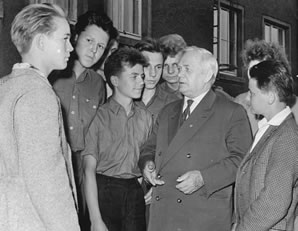
Hans Marchwitza (25 juni 1890 – 17 januari 1965)
De schrijver temidden van FDJ jeugd in 1959
De Franse schrijver en dramaturg Georges Courteline (eig. Georges Victor Marcel Moineaux ) werd geboren op 25 juni 1858 in Tours. Net als zijn vader, Jules Moineaux, is hij bekend geworden als humoristisch schrijver. Via vader Moineaux verwierf hij een zorgeloos baantje en zo werd Georges kantoorklerk bij het Ministerie van Godsdienstzaken. Zijn taak bestond uit het kopiëren van beleidsstukken en verslagen en jaarlijks moest hij 4000 pagina’s overschrijven. Dit geestdodend handwerk maakte hem niet enthousiast om zich uit te sloven voor promoties. Wel leverde het de stof voor een roman en een toneelstuk: Messieurs les ronds-de-cuir uit 1893 is een humoristisch relaas over irritante figuren en duizelingwekkende reglementen op de burelen van ministeries.
Uit: Messieurs les ronds-de-cuir
„À l’angle du boulevard Saint-Germain et de la rue de Solférino, un régiment de cuirassiers qui regagnait au pas l’École militaire força Lahrier à s’arrêter. Il demeura les pieds au bord du trottoir, ravi au fond de ce contretemps imprévu qui allait retarder de quelques minutes encore l’instant désormais imminent de son arrivée au bureau, conciliant ainsi ses goûts de flâne avec le cri indigné de sa conscience.
Simplement – car l’énorme horloge du ministère de la Guerre sonnait la demie de deux heures – il pensa :
— Diable ! encore un jour où je n’arriverai pas à midi.
Et les mains dans les poches, achevant sa cigarette, il attendit la fin du défilé.
Au-dessus de lui, c’était l’éblouissement d’un après-dîner adorable. Comme il advient tous les ans, Paris, qui s’était endormi au bruit berceur d’une pluie battante, s’était réveillé ce matin-là avec le printemps sur la tête, un printemps gai, charmant, exquis, tout frais débarqué de la nuit sans avoir averti de sa venue, en bon provincial qui arrive du Midi, tombe sur les gens à l’improviste et s’amuse de leur surprise. Par-delà les toits des maisons, derrière les hautes cheminées, le ciel d’avril s’étendait d’un bleu profond et sans un nuage, perdu au loin dans une grisaille brumeuse.“
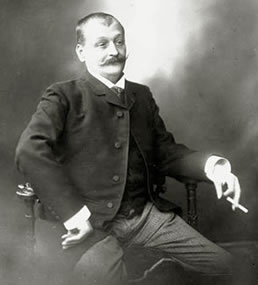
Georges Courteline (25 juni 1858 – 25 juni 1929)
De Duitse dichter, schrijver en ingenieur Heinrich Seidel werd geboren op 25 juni 1842 in Perlin, Mecklenburg-Schwerin. Hij studeerde aan het Polytechnikum in Hannover en in Berlijn. Vanaf was hij als ingenieur betrokken bij de bouw van het Berlijnse treinstation Anhalter Bahnhof. In 1880 gaf hij zijn beroep op om zich geheel aan het schrijven te wijden. In zijn bekendste, nog steeds herdrukte werk Leberecht Hühnchen is hij de beschrijver van het eenvoudige geluk.
Das Sonett
So recht geeignet ist für spitz verzwickte
Verschnörkelte Ideen die verzwackte
Sonettenform, und für modern befrackte
Gedanken eine wunderbar geschickte
Und wer von Weisheit nur ein Körnlein pickte
Und von Ideen nur ein Ideelein packte,
Der zwängt es gerne in die höchst vertrackte
Sonettenhaut, die viel und oft geflickte.
Die Freude dann, wenn das Glück ihm glückte
Und schwitzend er sein Nichts zusammen stückte,
Darob er manche Stunde mühsam hockte!
Doch hilft’s ihm nimmer, dass er drückt’ und druckte,
Weil gähnend ob dem künstlichen Produkte
Die Menschheit ruhig einschläft, die verstockte!

Heinrich Seidel (25 juni 1842 – 7 november 1906)
De Duitse dichteres Friederike Kempner werd geboren op 25 juni 1836 te Optatow in de provincie Posen. Ze droeg wel de bijnaam der silesische Schwan, maar zij avanceerde al gauw tot moeder van de onvrijwillige humor, die ze in tal van verzen aan het papier toevertrouwde. Daarmee heeft ze haar tijdgenoten en nakomende generaties zodanig opgevrolijkt dat haar werk in tal van edities en oplagen is verschenen. Friederike Kempner overleed op 23 februari 1904 in Friederikenhof bij Reichtal.
Amerika
Amerika, du Land der Träume
Du Wunderwelt, so lang und breit
Wie schön sind deine Kokosbäume
Und deine rege Einsamkeit.
Abdel-Kaders Traum
Wolkenloses himmlisches Gewölbe,
Unter mächtigen Palmen Purpurzelt,
Eine Reiter-Karawane hält,
Auf dem Boden Wüstensand, der gelbe.
Krachend unterirdisches Gewölbe,
Fünfzehnhundert Leichen, tiefentstellt, –
Jede Leiche war ein wackrer Held, –
Speit die Flamme rasselnd aus, die gelbe.
Solch’ ein Traumbild Abdelkader grüßte,
Trunken er der Heimat Boden küßte:
«Allah, Allah« – ruft er, – »meine Wüste!«
»Pellissier, Dein fürchterlicher Brand!« –
Plötzlich sich der Held im Traum ermannt,
Seine Blicke trafen Kerkerswand! –
Schweiß
Willst gelangen Du zum Ziele,
Wohlverdienten Preis gewinnen,
Muß der Schweiß herunter rinnen
Von der Decke bis zur Diele!
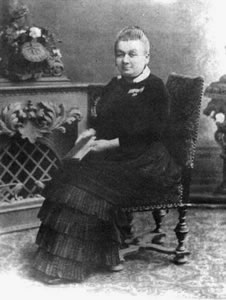
Friederike Kempner (25 juni 1836 – 23 februari 1904)
